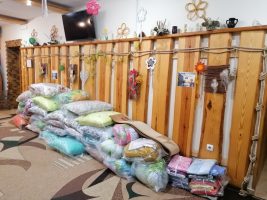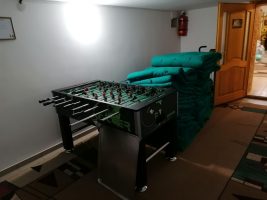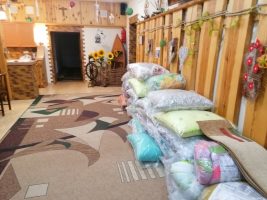
(from Tiraspol) Fear is growing in Transnistria – the pro-Russian separatist region of Moldova, not far from the border with Ukraine – after this morning’s attack in Maiac, in the district of Grigoriopol, where two explosions hit and knocked down radio towers broadcasting the signal of the Russian state media. The attack follows yesterday’s one in the capital Tiraspol against the headquarters of the secret services of the KGB.
Parish bunker. The risk of Transnistria’s involvement in the ongoing war between Russia and Ukraine has prompted the Holy Trinity Parish of Tiraspol to set up a bunker to be used in case of air attacks. For years, the parish has been carrying out an intense work of solidarity that ranges from home care for the seriously ill and terminally ill to the reception in the “Petruska” house of 24 street children and children in distress, which number up to 40 during the day, as well as housing for university and high school students.
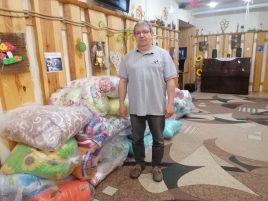 The concern for an escalation of the war and for the fate of the children residing in the house prompted the parish priest, Father Piotr Kuszman, to set up the bunker. “Today – he tells Sir – in the parish they brought some mattresses. As a precaution, we are preparing an anti-aircraft shelter in case of attacks. We are here underground. And we will bring here the children that we shelter in the Petruska center. We have also bought bottles of water and supplies of durable foods”.
The concern for an escalation of the war and for the fate of the children residing in the house prompted the parish priest, Father Piotr Kuszman, to set up the bunker. “Today – he tells Sir – in the parish they brought some mattresses. As a precaution, we are preparing an anti-aircraft shelter in case of attacks. We are here underground. And we will bring here the children that we shelter in the Petruska center. We have also bought bottles of water and supplies of durable foods”.
“I don’t want to scare anyone but after yesterday’s explosions I have to be ready for all eventualities, including an armed attack.”
“The explosions in recent days – continues the Dehonian priest of Polish origins who leads a community of about 100 Catholics – have frightened people. There is panic, actually. This morning we saw a great surge of people fleeing from Transnistria towards Moldova. A flow of cars on all border crossings.
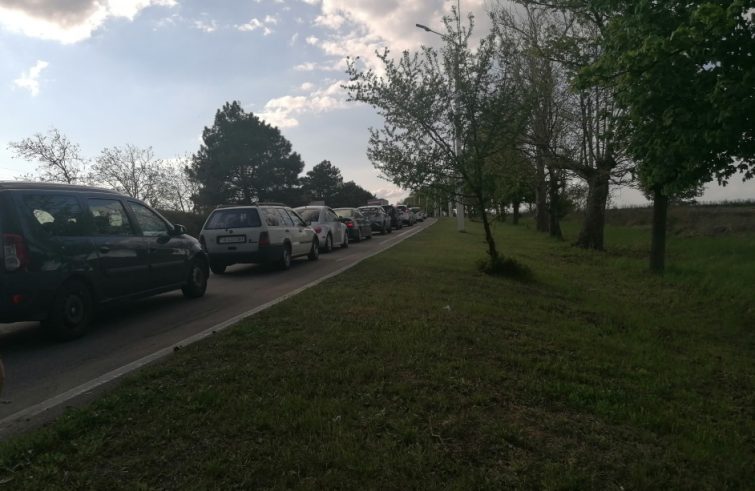
Today, the authorities announced a 15-day state of ‘red alert’ for terrorism. “This means – says the parish priest – that there will be checkpoints at the entrances to many cities. People entering and exiting at night will be checked and controls will also be made during the day. In this respect, the authorities’ official decision not to hold the traditional military parade and the march of the ‘Regiment of the Immortals’, in which ordinary citizens parade with portraits of their relatives who fought in World War II, is telling. “No public demonstrations are allowed. Father Kuszman explains that
“already a week ago there was talk that the next phase of Russian aggression in Ukraine would involve the southern part of the country up to Odessa and immediately after, Transnistria. But to justify such an intervention the Russians need to say that the Russian-speaking population here is oppressed.”
In short, what happened in Donbass is being repeated here and the explosions of recent days are serving as a “provocation”. Around here some swear that the arrival of the Russians would be greeted by applause and the tossing of flowers. But there is also the certainty of a firm reaction from Ukraine. The future doesn’t seem to be promising. Nobody talks about diplomacy and negotiation anymore.
Shifting responsibility. The parties are blaming each other even though in words they are showing a willingness to dialogue. Following today’s meeting of the Security Council of Moldova, President Maia Sandu said that behind the attacks of the last two days in Transnistria there are attempts to cause an escalation of tension in the region, especially by “pro-war factions, interested in destabilizing the situation. We condemn all provocations and attempts to involve Moldova in actions that could endanger peace. Our government remains determined to resolve the conflict through dialogue.” For the leader of Transnistria, Vadim Krasnoselsky, “Those who organized these attacks aim to drag our country into a conflict. But this will not happen. It is necessary to maintain peace”, concluded Krasnoselsky, who called on Ukraine to “investigate the illegal movement of specific combatant groups that have perpetrated terrorist attacks on our territory” and appealed to Moldova “not to get involved in an aggression against Transnistria”. From Ukraine the answer was immediate: the Ukrainian General Staff reported that the Russian military forces deployed in Transnistria as well as the separatist militias “have been put on full combat alert” .
Transnistria in solidarity. However, when the war broke out on February 24, Transnistria, like Moldova, did its best to welcome refugees from Ukraine. “About 20,000 arrived – recalls the parish priest – many were welcomed by friends and relatives. They came from Odessa, Mykolaïv and other cities in the south. The local authorities have set up reception centers in all the largest cities in the country, opened hotels and guest houses, offered meals, sanitary kits, clothing, and even money to allow Ukrainian refugee families to pay rent. They also set up a toll-free number to notify them of any potential requirements. Our parish of the Holy Trinity, the only one in Tiraspol, also contributed by collecting food and medicine, delivering packages to those who asked for them”.
- Allestimento bunker (foto Sir)
- Allestimento bunker (foto Sir)
- Allestimento bunker (foto Sir)
Praying for peace. The parish priest points out that what worries the local Catholic Church is “the rift that this conflict is generating in people and the fact that the first victim of the war is the truth”. Father Marcin Janus, pastor of St. Martha’s parish in northern Transnistria, is familiar with this. “When I referred to the war in one of my sermons, they called me from the local KGB. They said I preached extremism and incitement to public disorder.” “The propaganda that comes from Russia – explains Father Piotr – is spreading the opinion that the Ukrainians are fascists and neo-Nazis. In my parish I have situations like this. Even family members are divided up to the point of breaking family ties. In the parish, therefore, we cannot talk about politics. We pray in peace, for peace. This is what we can do”.

